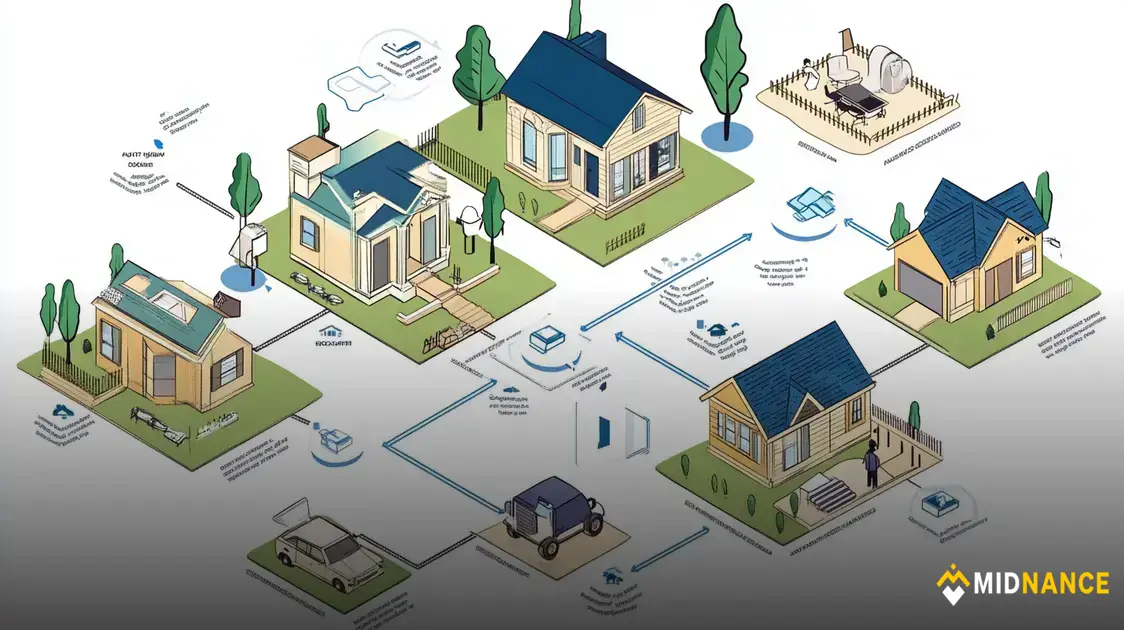Home Loan Solutions are critical tools for making homeownership a reality, offering various financing options tailored to your needs. Whether you’re purchasing your first home or refinancing an existing property, finding the right home loan can significantly impact your financial future.
By exploring different loan types, interest rates, and repayment terms, you can choose the most suitable option to fit your budget and long-term goals. It’s important to stay informed about your options to ensure you’re making a wise financial decision.
Continue reading to learn more about home loan solutions and how to secure the best deal for your property purchase!
Understanding Home Loan Solutions
Understanding Home Loan Solutions is crucial for anyone looking to purchase a home. These solutions help you figure out the best way to finance your property. Essentially, a home loan is money borrowed from a bank or financial institution to buy a house. You pay back this money in instalments, along with interest, over a set period.
Types of Home Loans
There are several types of home loans, including fixed-rate loans, variable-rate loans, and interest-only loans. Fixed-rate loans have a constant interest rate throughout the loan term, making budgeting easier. Variable-rate loans can change over time, meaning your repayments may increase or decrease.
Why Understanding Terms Matters
Familiarising yourself with terms such as principal, interest, amortization, and terms can make finding the right loan much simpler. The principal is the amount you borrow, while interest is the cost of borrowing. Amortization refers to the schedule for paying back your loan.
The Importance of Credit Score
Your credit score plays a significant role in whether you qualify for a home loan and the interest rates you are offered. A higher score typically results in better terms, which can save you money over time. Checking your score before applying can help you find ways to improve it.
Researching Loan Providers
Not all lenders offer the same home loan solutions, so it’s vital to research various providers. Some banks or credit unions may offer more competitive interest rates or better customer service. Shopping around ensures you find the loan that best meets your needs.
Professional Advice
Consulting with a financial advisor or mortgage broker can provide additional insights. They can help you navigate through the choices available and ensure you don’t miss out on potential savings.
Understanding home loan solutions gives you access to affordable financing options. The more you know, the better prepared you will be to make informed decisions regarding your home purchase.
Types of Home Loans Available
When looking for home loan solutions, it’s important to understand the various types of home loans available. Each type has its unique features and benefits to suit different needs, budgets, and circumstances.
Fixed-Rate Home Loans
Fixed-rate home loans offer a consistent interest rate throughout the loan term, usually ranging from 15 to 30 years. This means that your monthly payment remains the same, making budgeting simpler.
Variable-Rate Home Loans
Variable-rate home loans have interest rates that can change over time, usually in line with the market. This means your monthly payments may increase or decrease, offering the potential for lower initial costs.
Interest-Only Home Loans
Interest-only loans allow you to pay only the interest for a specified period, usually 5 to 10 years. After this period, you then start repaying the principal. This can be appealing for those who want lower initial payments.
First-Time Home Buyer Loans
Specialised loans for first-time homebuyers often come with benefits like lower down payments and less stringent credit requirements. These loans aim to make it easier for new buyers to enter the property market.
Government-Backed Loans
Loans backed by government agencies, such as FHA (Federal Housing Administration) and VA (Veterans Affairs), can provide more accessible financing options with competitive rates. They usually have less strict credit requirements.
Home Equity Loans
A home equity loan allows you to borrow against the equity in your home, usually in a lump sum. It often has a fixed interest rate and is useful for major expenses, like renovations.
Line of Credit Loans
A home equity line of credit (HELOC) provides a revolving line of credit based on your home’s equity, which you can draw on as needed. This option offers flexibility in how you access funds.
Selecting the right type of home loan is essential. By understanding these various options, you can find the best fit for your financial situation and homeownership goals.
How to Choose the Right Home Loan

Choosing the right home loan involves understanding your financial situation and the different options available. Here are some important steps to follow:
Assess Your Financial Situation
Start by evaluating your income, debts, and overall budget. Knowing how much you can afford to borrow will help narrow down your options. Consider using a home loan calculator to estimate monthly repayments.
Understand the Types of Loans
Familiarise yourself with the different types of home loans as discussed earlier. Each loan type has various features, benefits, and risks. This understanding will lead you to a suitable choice.
Compare Interest Rates
Interest rates can vary significantly between lenders. Shop around and compare rates from multiple banks, credit unions, and other lenders. Even a small difference in interest rates can lead to substantial savings over the life of the loan.
Check Loan Terms
Loan terms, including the length of the repayment period and payment structure, are crucial. Some loans might offer lower monthly payments but could cost more in interest over time. Ensure you choose a term that aligns with your financial goals.
Consider Additional Fees
Beyond interest rates, look at other costs involved in obtaining a home loan, such as origination fees, appraisal fees, and closing costs. Make sure to include these in your overall budget when choosing a loan.
Get Pre-Approved
Obtaining a pre-approval from a lender gives you a clear understanding of how much you can borrow. It also shows sellers that you are a serious buyer, which can be advantageous in competitive markets.
Consult a Mortgage Broker
A mortgage broker can offer valuable insights and help you navigate the loan process. They can connect you with lenders that offer the best terms and conditions based on your specific needs.
By carefully considering these factors, you can make an informed choice that helps you secure the most suitable home loan for your financial situation.
Common Mistakes to Avoid in Home Loans
Understanding the common mistakes to avoid in home loans can help you secure the best deal and ensure a smooth process. Here are some pitfalls to watch out for:
Not Checking Your Credit Score
Your credit score significantly affects the interest rates you are offered. Failing to check and improve your score before applying can result in higher costs. Always review your credit report and address any issues early.
Ignoring Loan Terms and Conditions
Many borrowers overlook the fine print. Not understanding the terms and conditions of your loan can lead to unexpected fees and charges. Make sure to read and comprehend all loan documents carefully.
Overborrowing
Just because a lender approves a certain amount doesn’t mean you should take it. Borrowing beyond your means can lead to financial strain. Stick to a budget that aligns with your income and lifestyle.
Not Shopping Around
Many people settle for the first loan offer they receive. It’s essential to compare rates and terms from multiple lenders. This practice can save you money and help you find a loan that better fits your needs.
Forgetting About Additional Costs
Home loans often come with additional costs, such as closing costs, appraisal fees, and insurance. Don’t forget to factor these into your overall budget to avoid surprises later on.
Neglecting to Get Pre-Approved
Skipping the pre-approval process can put you at a disadvantage when purchasing a home. Pre-approval gives you clarity on your budget and shows sellers you are a serious buyer.
Rushing the Decision
Buying a home is a significant financial decision that shouldn’t be rushed. Take your time to research different options, ask questions, and make informed choices.
Avoiding these common mistakes can lead to a better home loan experience. Make sure you approach the process with awareness and care to secure a loan that suits your financial goals.
Benefits of Using Home Loan Solutions
Using home loan solutions offers numerous benefits that can help make the home-buying process easier and more manageable. Here are some key advantages:
Access to Diverse Options
Home loan solutions provide access to a wide range of loan types. Whether you are looking for fixed-rate, variable-rate, or government-backed loans, having various options allows you to choose one that best fits your financial situation.
Improved Financial Management
By choosing the right loan structure, you can better manage your finances. Fixed-rate loans, for instance, offer predictable payments that can assist with long-term budgeting.
Competitive Interest Rates
Home loan solutions often allow you to compare interest rates across multiple lenders. This can lead to securing a lower rate, saving you money over the life of the loan.
Professional Guidance
Many lenders offer expert advice on home loan solutions. This guidance can be invaluable in helping you understand your options and make informed decisions.
Potential for Lower Down Payments
Some home loan solutions cater to first-time buyers or those with lower incomes. These loans may require smaller down payments, making homeownership more accessible.
Streamlined Application Processes
Technology has enhanced the application process for home loans. Online applications can be quicker and more user-friendly, enabling you to apply from the comfort of your home.
Support for Home Improvements
Certain home loan solutions include options for financing renovations and upgrades. This allows you to buy a home that may need some work and finance those improvements in one loan.
By understanding and utilising these benefits, you can navigate the journey to homeownership with greater ease and confidence.
The Application Process Explained

Understanding the application process for home loans is essential for a successful home purchase. Here’s a step-by-step guide to help you navigate this important journey:
Step 1: Pre-Qualification
Start by getting pre-qualified to understand how much you can afford to borrow. This involves sharing your financial information with the lender, such as your income, debts, and credit score. They will provide an estimate of how much you can spend on a home.
Step 2: Application Submission
Once you’ve selected a lender, it’s time to complete and submit your loan application. Provide detailed information about your financial situation, the property you wish to purchase, and any other relevant documentation.
Step 3: Document Collection
The lender will request various documents to verify your information, such as pay stubs, tax returns, bank statements, and identification. Ensure you provide accurate and complete documents to avoid delays.
Step 4: Underwriting Process
After submitting your documents, your application goes into underwriting. An underwriter will review your financial profile and assess the risk of lending to you. They may request additional information during this stage.
Step 5: Loan Approval
If the underwriter is satisfied with your application, they will issue a loan approval. This document outlines the terms of your loan and any conditions that need to be met before closing.
Step 6: Closing the Loan
Lastly, you will attend the closing meeting, where you will sign all the final documents. This includes the mortgage agreement and any other legal paperwork related to the purchase. Once completed, you’ll receive the keys to your new home!
Being informed about each step of the application process ensures that you are prepared and can move forward with confidence, finding the right home and loan to suit your needs.
Frequently Asked Questions about Home Loans
Many people have questions when it comes to home loans. Here are some frequently asked questions that can help clarify your understanding:
What is a home loan?
A home loan is a type of financing that allows you to borrow money to purchase a home. You typically repay the loan amount along with interest over a specific period.
What is the difference between a fixed-rate and a variable-rate loan?
A fixed-rate loan has a constant interest rate for the entire term of the loan, providing stability in payments. A variable-rate loan, on the other hand, has an interest rate that can change based on market conditions, leading to fluctuating repayments.
How much can I borrow?
The amount you can borrow depends on several factors, such as your income, credit score, and debt-to-income ratio. Lenders typically conduct assessments to determine your borrowing capacity.
What are closing costs?
Closing costs are fees associated with finalising your mortgage and can include things like origination fees, appraisal fees, and title insurance. It’s essential to factor these costs into your budget when purchasing a home.
Do I need a down payment?
Yes, most home loans require a down payment. The amount can vary based on the type of loan and lender but is generally between 3% to 20% of the home’s purchase price.
How long does the application process take?
The application process can vary in length depending on the lender and your financial situation. Typically, it can take anywhere from a few weeks to a couple of months to get approved.
Can I pay off my loan early?
Many lenders allow you to pay off your loan early without penalties, but it’s essential to check the specific terms of your loan agreement. Some loans may have prepayment penalties.
By understanding these commonly asked questions, you can make informed decisions regarding your home loan journey.





